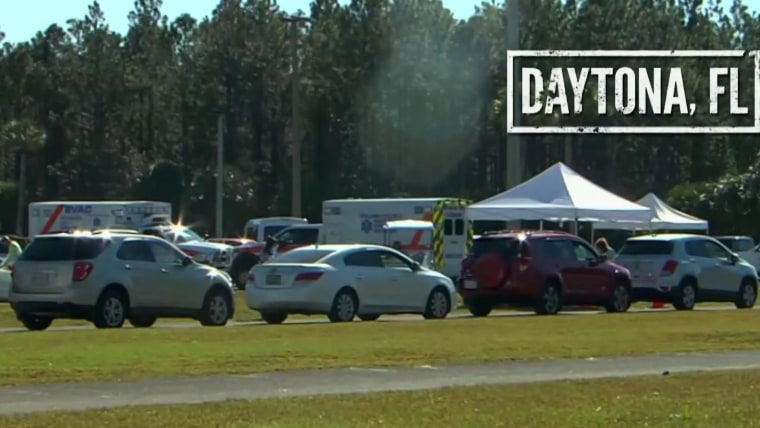MIAMI — After a week and a half of leaving voicemails, writing emails and checking hospital websites, Harvey Rogers is hoping he and his wife are on a waiting list somewhere for a Covid-19 vaccine.
But the 75-year-old lawyer and resident of Pinecrest, an upscale Miami-Dade County neighborhood, is not really sure, since no one has replied.
Rogers, who is diabetic and has high blood pressure, said it’s frustrating.
“You feel the government is not telling you the truth,” Rogers said, adding that if the state and federal governments were more forthcoming about when and where the vaccine would be available there would be less of a “feeling of anxiety and being left out of the loop.”
Full coverage of the coronavirus outbreak
In the two weeks since Florida’s governor said the Covid-19 vaccine would be available to residents 65 and over, the vaccination registration process has been inconsistent across county lines, causing chaos, confusion and disappointment among its senior population and their relatives.
The registration process has been disparate and inconsistent: Websites have crashed; hospital phone lines are jammed; and scams have convinced people to pay for nonexistent vaccination slots. In some places, elderly people camped out overnight in hopes of receiving a vaccine.
Florida, with a population of more than 21 million, has had the third-highest count of Covid-19 cases in the United States over the past 7 days, just after California and Texas. It ranks sixth in deaths.
Exacerbating anxiety among seniors, Florida announced last week the first case of the more contagious coronavirus strain, known as B.1.1.7, which was first found in the United Kingdom.
With that in mind, it has become a race against the clock for many older Floridians to get vaccinated.
Part of the confusion is the state never developed a consistent strategy for its 67 counties to implement a vaccination program. While in some counties vaccines were allocated to public hospitals for distribution, other counties were relying on their health department to set up vaccines through the ticketing app Eventbrite.
Although several counties have successfully used Eventbrite to schedule appointments, it has led to scams in others. In Port Richey, north of Tampa, some of the people who showed up at a Covid-19 vaccination clinic in recent days thinking they had appointments found out that their names weren’t on the books, said Melissa Watts, a spokesperson for the Florida Department of Health.
Though the vaccinations are free, “people also said they were charged a fee to register,” Watts said in an email. “After looking into it further, we realized there was a fake Eventbrite account being used to scam people out of their money.”
It wasn’t immediately clear how many people were affected, but health officials said they were referring the complaints to state and local law enforcement for possible investigation. Two counties, Pasco and Pinellas, issued warnings to the public.
“Someone created a FAKE Eventbrite account to register for the COVID-19 vaccination. You should NOT be charged to register. Registration is FREE,” the counties said in identical tweets.
A spokesperson for Eventbrite said that the company is “actively exploring how our platform can best support the effort to increase access to vaccines” but cautioned users to verify the legitimacy of any pages.
“We recommend anyone registering for any COVID-19-related event verify and direct questions to their local health service officials,” the spokesperson said.
Some counties said Eventbrite worked well for their residents because it’s easy to use. In Seminole County, people used Eventbrite to scoop up 2,500 vaccination appointments within 30 minutes of when they went live Tuesday morning, said Andy Wontor, a county spokesperson. People who have signed up for the county’s emergency text messages get a text with a link when appointments are available.
In Daytona Beach and Lee County in southwest Florida, thousands of elderly people camped out overnight in long lines after their county health departments announced they would distribute vaccines on a first-come, first-serve basis.
In Miami-Dade, the state’s most populous county with the highest number of Covid-19 infections, Mount Sinai Hospital in Miami Beach had been the sole entity administering vaccines to the public until Tuesday. Miami-Dade is ranked fourth in the country for confirmed cases, according to John Hopkins University and Medicine.
Mount Sinai has been inundated with phone calls and has been scheduling about a thousand appointments a day, according to hospital CEO and President Steven Sonenreich.
“There is tremendous demand to be vaccinated,” Sonenreich said.
Some hospitals and health departments have been criticized for requiring that appointments be scheduled exclusively online because some seniors are not that internet savvy and may have trouble using a computer or smartphone.
“We took into consideration every aspect of this in trying to make things as simple as possible,” Sonenreich said.
Miami’s public hospital, Jackson Health System, rolled out an online platform Tuesday morning to schedule vaccinations. It went live at least two hours earlier than the hospital had announced it would, and in less than two hours, its 12,000 slots were filled, leaving many people angry that they were unable to secure an appointment. A hospital spokesperson said they would continue to open slots as more vaccines become available.
Broward County, with the second-highest number Covid-19 cases in the state, launched a sign-up website for their drive-through vaccination system last week, but it crashed hours after going live because of overwhelming demand. The website was taken down for maintenance. Shortly after relaunching Monday morning, the county’s health department announced that its 26,465 slots were filled.
But on Tuesday, the county reported another problem. “Due to a scheduling glitch, more appointments were given than could be served in a day,” it said in a tweet, announcing that some people had to reschedule.
Broward Health, the county’s public hospital, also experienced technical issues with its hotline due to the volume of calls. They announced the next day they were fully booked through February.
Gov. Ron DeSantis held two news conferences Monday, in Central Florida and Miami, and pressured hospitals to vaccinate people as quickly as possible and to operate seven days a week.
He said hospitals have the infrastructure and the personnel to get people vaccinated quickly. He also warned “hospitals that do not do a good job of getting the vaccine out will have their allocations transferred to hospitals that are doing a good job of getting the vaccine out.”
Download the NBC News app for full coverage of the coronavirus outbreak
The state Department of Emergency Management is working with the Department of Health to identify state-run Covid-19 testing sites that can be converted into vaccination sites. The number of sites that open will depend on the number of vaccines the state receives on a weekly basis.
The state is also identifying places of worship in underserved communities where vaccines can be administered.
DeSantis said the state is expecting to get 50 percent more vaccines in January than it did in December. Right now, 80 percent of the vaccine doses have already been distributed to hospitals.
“I’m not going to say there hasn’t been any problems, but I think, all in all, the distribution has gone probably better than what would reasonably be expected,” DeSantis said.
Carmen Sesin reported from Miami. David Ingram reported from San Francisco.
Source: | This article originally belongs to Nbcnews.com











